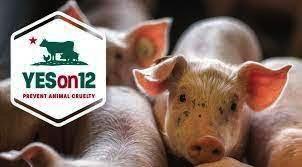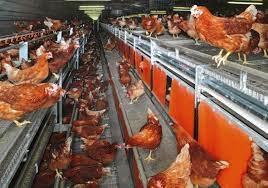According to the Orange County Register, California consumers are about to pay for implementation of Proposition #12 adopted in November 2018 that came into effect on January 1st, 2022.
 Proposition #12 entitled Establishing New Standards of Confinement of Certain Farm Animals: Banning Sale of Certain-Non Complying Products established minimum space requirements for veal calves, breeding sows, and egg producing hens. To prevent “unfair competition” the State of California issued regulations requiring out-of-state producers shipping products to California to comply withstandards imposed on in-State producers.
Proposition #12 entitled Establishing New Standards of Confinement of Certain Farm Animals: Banning Sale of Certain-Non Complying Products established minimum space requirements for veal calves, breeding sows, and egg producing hens. To prevent “unfair competition” the State of California issued regulations requiring out-of-state producers shipping products to California to comply withstandards imposed on in-State producers.
It is now illegal to sell meat or eggs from animals that are not housed in compliance with the space requirements imposed in accordance with regulations based on Proposition #12. Contravention of the regulations is a misdemeanor with severe criminal and civil penalties.
The U.S. egg industry has transitioned from conventional cages to California-compliant systems initiated following the adoption of Proposition #2 in 2008. For many years, consumers in California have paid a premium on eggs purchased at supermarkets based on higher production costs and transport to the state. Producers in California with obsolete housing and facilities were either disinclined or unable to convert from cages to alternative housing. Larger producers were able to convert some houses and were able to raise capital to erect new housing. One large complex was erected in the Central Valley to supply the state market. In 1994, California held approximately 15 million hens. This number declined to a low of 10 million in 2015 with a slow increase to 13 million in 2021. It is estimated that the output of 25 million hens are required to compensate for the difference between demand and in-state production, assuming per capita egg consumption of the 40-million population in California is the same as the other states in the U.S. The difference between Midwest and California prices is referred to as the “Pacelle Tax” based on the fact that Wayne Pacelle, then President of the Humane Society of the United States, was instrumental in proposing and promoting Proposition #2.
 Availability of eggs in California will not be affected by Proposition #12 as the industry planned and invested in advance of the compliance date. The situation with regard to pork is however different. Proposition #12 was specifically aimed at sow gestation stalls that confined breeding animals over successive reproductive cycles from conception through transfer to farrowing crates. The major hog producers in the U.S. converted to group housing, following the lead of the egg industry. Many packers, insisted that hogs purchased for processing were derived from sows held in compliance with California requirements and the proposed regulations contemplated or introduced in other states. A number of companies, including Seabord Corporation, stonewalled and are now litigating to overturn regulations imposed in terms of Proposition #12. Federal circuit courts have successively rejected challenges to Proposition #12 and the regulations that prevent shipment of noncompliant product from a state of origin to California.
Availability of eggs in California will not be affected by Proposition #12 as the industry planned and invested in advance of the compliance date. The situation with regard to pork is however different. Proposition #12 was specifically aimed at sow gestation stalls that confined breeding animals over successive reproductive cycles from conception through transfer to farrowing crates. The major hog producers in the U.S. converted to group housing, following the lead of the egg industry. Many packers, insisted that hogs purchased for processing were derived from sows held in compliance with California requirements and the proposed regulations contemplated or introduced in other states. A number of companies, including Seabord Corporation, stonewalled and are now litigating to overturn regulations imposed in terms of Proposition #12. Federal circuit courts have successively rejected challenges to Proposition #12 and the regulations that prevent shipment of noncompliant product from a state of origin to California.
It is indeed unfortunate that additional costs for pork and related products will be added to the inflation in meat estimated at between 10 and 13 percent, depending on category. The California Department of Food and Agriculture estimates that Proposition #12 alone will increase the cost of food for every state resident by $50 per year. Given the population of California at 40 million, Proposition #12 carried at $2.0 billion price tag. This reality was omitted in the discussion and hype characterising the rush to ensure higher standards of welfare. Legislation by ballot is usually based on emotion and is subject to misinformation. It is questioned whether a three to one majority for passage of Proposition #12 would have been achieved if voters in a family of four knew that by adopting the proposition, the family budget would be increased by $200 each year. Given that California has minimal hog production, pork products are overwhelmingly imported from states with high production that is now required to comply with Proposition #12.